#JewishIdentity
Explore tagged Tumblr posts
Text
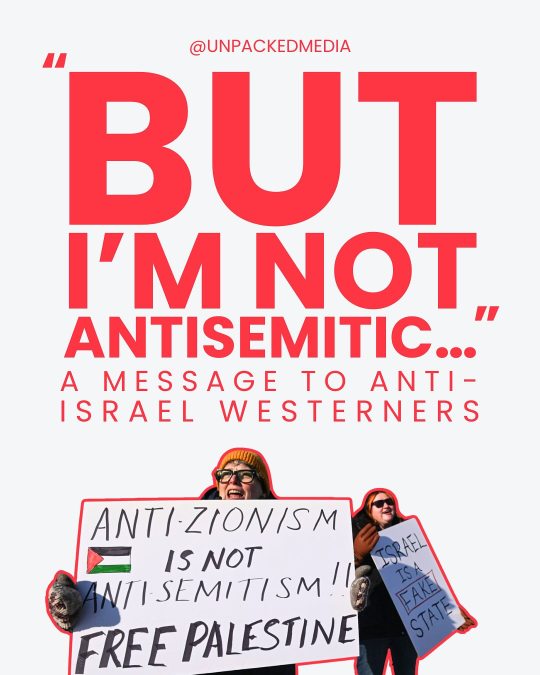

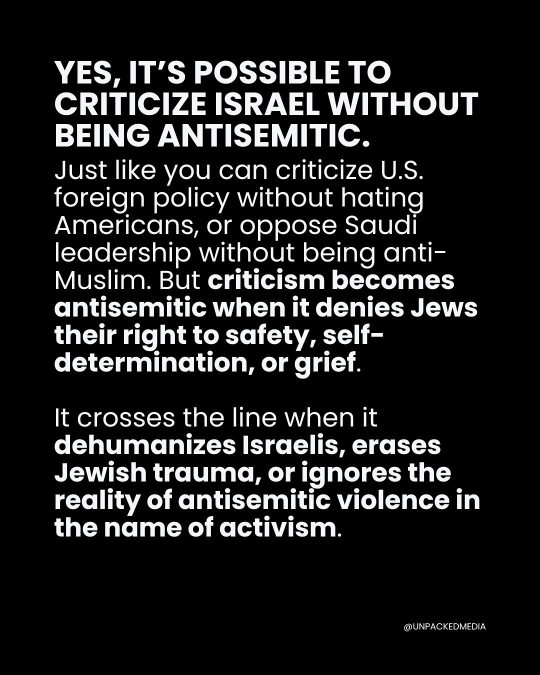
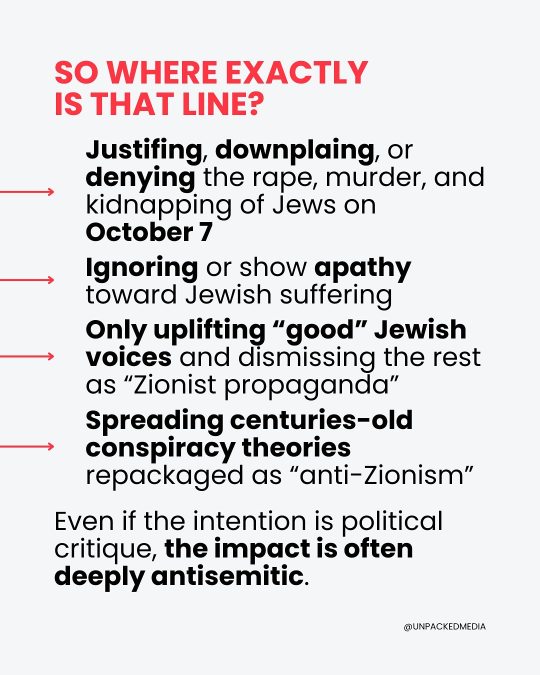
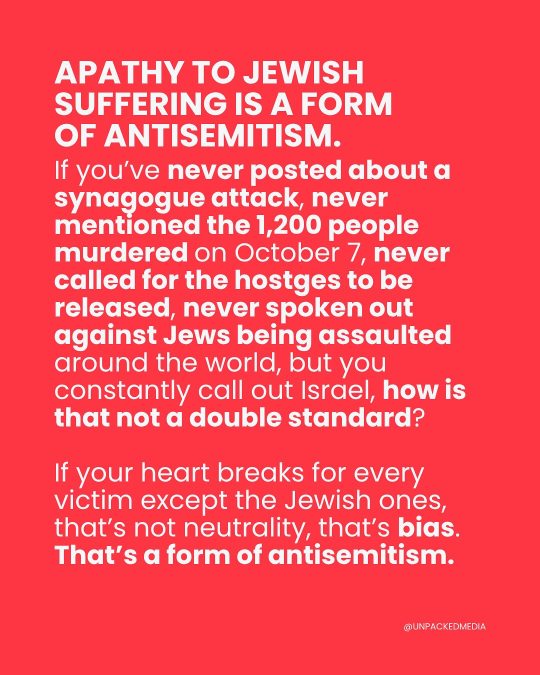
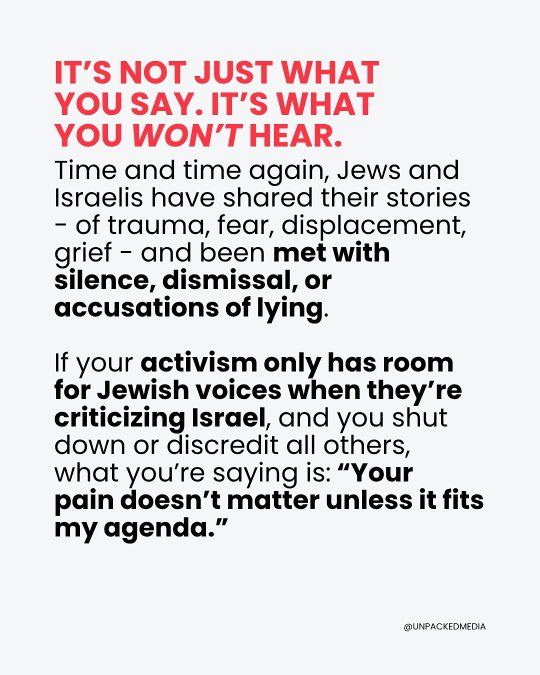
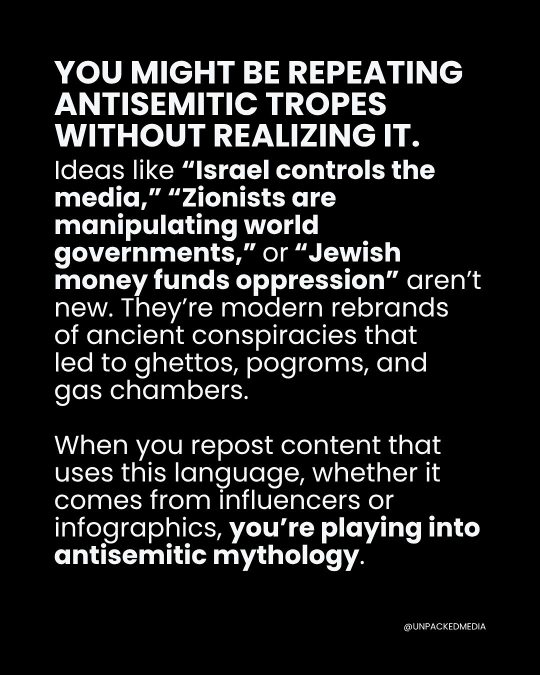
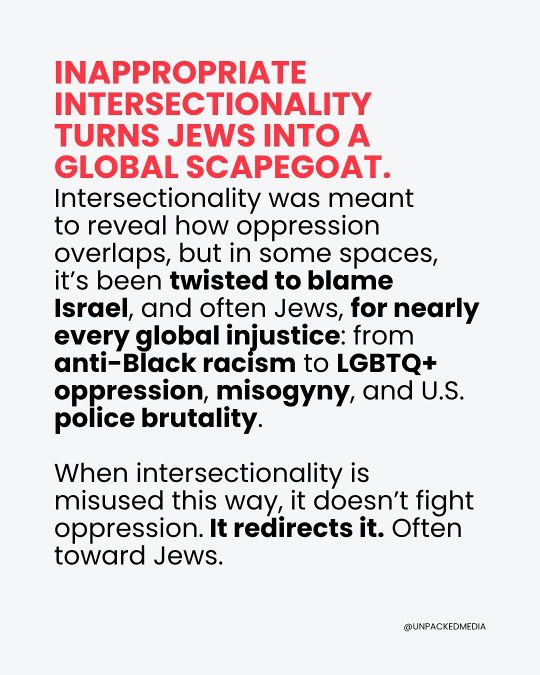
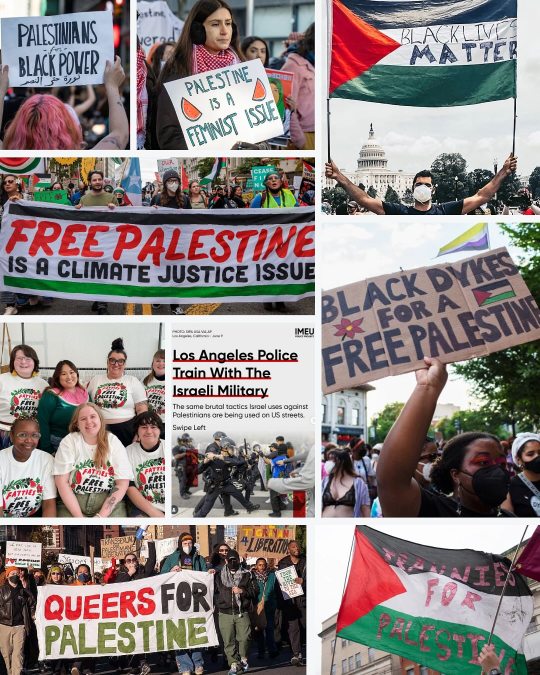
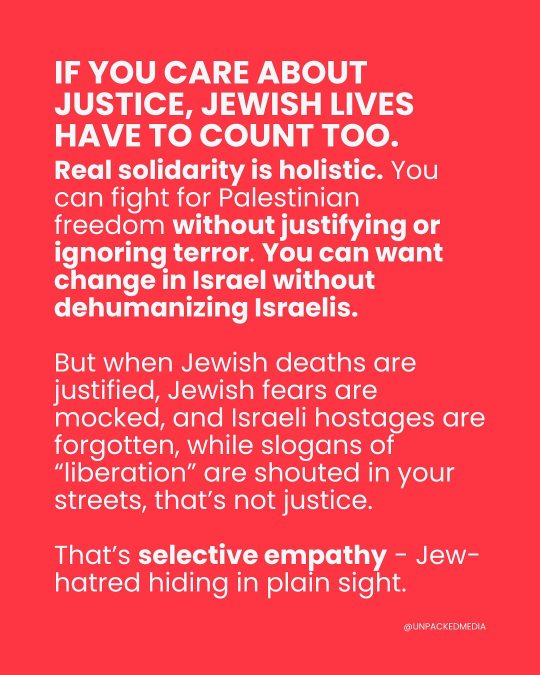

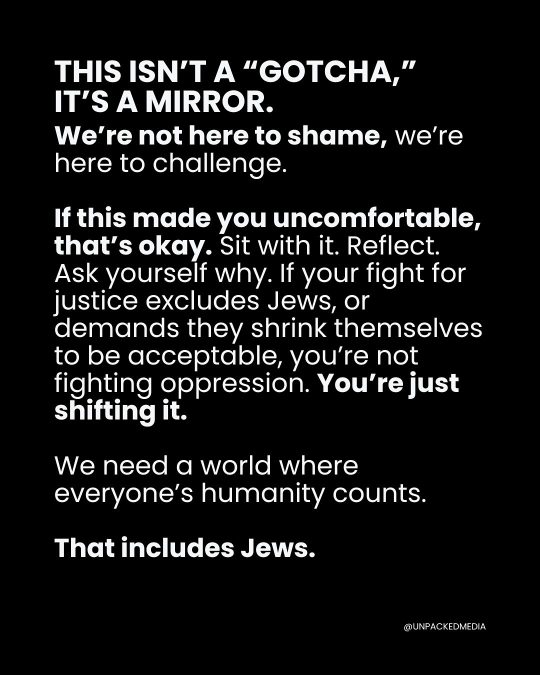
“But I’m Not Antisemitic…”
A message to anti-Israel Westerners.
You might truly believe your activism is rooted in justice. You might be horrified by antisemitism. You might even feel offended by the idea that your stance could contribute to it.
But if you ignore Jewish grief, deny or downplay October 7, or blame Israel for every global injustice—from racism to homophobia—what exactly are you fighting for?
If you only accept Jewish voices that validate your views and silence the rest, is that solidarity—or something else?
This isn’t a call-out. It’s a call-in.
Because if your vision of justice leaves no room for Jewish safety, identity, or pain…
then maybe it’s time to ask:
What do you really mean when you say, “I’m not antisemitic”?
Unpacked Media
#ButImNotAntisemitic#JewishVoices#UnlearnAntisemitism#AntiZionism#October7#DoJewsCount#ProgressiveSpaces#JewishIdentity#StopJewHate#QuestionYourActivism#JusticeForAll#IfYouCareYouCareAboutJews#Intersectionality
89 notes
·
View notes
Text
Growing Up Jewish in Berlin: Sara’s Fear of Speaking Hebrew in Public
In a quiet residential neighborhood in East Berlin, 11-year-old Sara lives with a fear that no child should have to carry. Artificial cobwebs from Halloween still hang on hedges, plastic pumpkins grin from doorsteps, but for Sara, the real fright is not from ghosts and ghouls—it’s from speaking Hebrew outside her home.
Sara, whose name has been changed for her safety, is a sixth-grader with dark curls that bounce as she moves. Like many children her age, she enjoys dressing up—this year, she went door to door on Halloween as "Wednesday" from The Addams Family. But unlike most of her classmates, Sara carries a deep anxiety with her every day.
"I'm afraid to speak Hebrew when I leave home because I fear someone will hear—and then yell at or attack me," she says, fidgeting with the sleeves of her striped shirt.
Her mother sits beside her at their large dining table, placing a gentle hand on Sara’s bouncing leg as she speaks. The fear is real, and it lingers in their home like an uninvited guest.
A Childhood Marked by Fear
Sara was born in Israel, where she spent her early childhood in a country accustomed to war. Air-raid sirens were a part of life. “When there were sirens and Sara started screaming, we would pull her out of bed,” her mother recalls.
It was precisely this kind of fear that her parents wanted to leave behind when they moved to Germany. “As a teenager in Israel, you live in fear that someone will blow up the bus on the way to school,” her mother explains. Wanting their children to grow up in a safer environment, they chose Berlin as their new home.
For years, the family felt secure. But after the Hamas attack on Israel on October 7, tensions in Germany have risen dramatically. Anti-Semitic incidents have surged, pro-Palestinian protests have become heated, and Jewish families like Sara’s are feeling increasingly vulnerable.
The Fear of Being Recognized
Sara used to speak Hebrew with her parents during her subway ride to school. Now, they only speak German in public. She still calls them every morning as she commutes, but the familiar comfort of their native tongue has been silenced by fear.
Even in her dreams, this fear follows her.
"Yes, I sometimes have nightmares," she says hesitantly.
What kind of nightmares?
"That I speak to my mother in Hebrew and then someone starts insulting me or something."
For Sara, Germany was supposed to be a place of refuge, a place where she could feel safer than in Israel. Instead, she now finds herself in a different kind of fear—one that exists in whispers, sideways glances, and the quiet self-censorship of her own identity.
A Divided Life
One of the hardest things for Sara is being away from her extended family. “It just sucks that my family is in Israel,” she says bluntly.
Her uncle, her mother’s brother, volunteered for the Israeli army and is now stationed near the Gaza Strip. The family had planned their annual visit to Israel over the holidays, but with the war, they’ve canceled their trip.
At school, things feel normal—for now.
"There’s no one there who I'm afraid of," she says. Her teacher briefly mentioned the war once, but it hasn’t been a major topic in class.
Her closest friends are Muslim girls, and so far, their friendship remains unaffected. “Fortunately, the war against Hamas and the protests in Berlin haven’t been an issue between our families,” her mother says.
But when classmates ask Sara about the situation in Israel, she chooses the safest answer:
"I don’t know."
A Childhood That Should Be Free
Sara is only 11 years old. She should be worrying about homework, friends, and what to wear for the next Halloween—not about whether it’s safe to speak her native language in public.
For Jewish families in Germany, the fear of anti-Semitism has become an ever-present reality. And for Sara, that reality is shaping the way she moves through the world, even in the city she calls home.
#JewishLifeInGermany#Berlin#HebrewLanguage#AntiSemitism#ChildhoodFear#JewishChildren#HamasAttack#Germany#Israel#SaraInBerlin#JewishIdentity#WarAndChildren#CulturalFear#BerlinJewishCommunity#SpeakingHebrew#SafetyConcerns#MiddleEastConflict#JewishFamilies#GermanyIsraelRelations#RisingAntiSemitism
5 notes
·
View notes
Text
Judaism, Israel, and Identity | Understanding the Key Differences | iShook
youtube
Learn about the differences between Judaism, the Jewish people, and the State of Israel. Explore the complexities of government, democracy, and individual opinions in Israel. Discover the beauty of democracy through the ability to critique and love a country simultaneously.
#judaism#jewishidentity#stateofisrael#israelpolitics#religionandculture#middleeastdiscussion#democracyinIsrael#jewishculture#understandingjudaism#faithandpolitics#israeldebate#jewishpeople#separatingpoliticsandreligion#identityandbeliefs#modernisrael#Youtube
0 notes
Text
Celebrating Tradition, Crafting Identity: The Art of Yarmulkes in Modern Jewish Life
In Jewish tradition, the yarmulke (kippah) is a humble yet profound symbol—a daily reminder that faith and identity rest gently atop our heads, guiding our actions and connecting us to community. At yarmulkes.com, we don’t just sell head coverings; we craft pieces that honor heritage, celebrate milestones, and empower individuals to express their unique stories.
Today, I want to share how this small but mighty accessory bridges ancient customs with contemporary life—and why businesses, families, and organizations trust us to be part of their most meaningful moments.
1. The Craftsmanship Behind Every Kippah
In a world of mass production, we prioritize artisan quality. Each yarmulke in our collection is handcrafted using premium materials:
Luxury Fabrics: Silk, satin, and velvet for weddings and holidays.
Everyday Durability: Breathable cotton, knit, and suede for comfort and longevity.
Innovative Prints: Bold geometric patterns, custom embroidery, and even themed designs (yes, we’ve made kippot featuring everything from soccer balls to corporate logos!).
For us, craftsmanship isn’t just about aesthetics—it’s about creating heirlooms that families pass down through generations.
2. Yarmulkes as a Canvas for Identity
A yarmulke is more than a religious garment; it’s a statement of who you are and what you value. We’ve had the privilege of collaborating with:
Couples: Custom kippot embroidered with wedding dates or Hebrew vows.
Nonprofits: Bulk orders for community events, featuring organizational logos.
Corporations: Branded yarmulkes for diversity-focused initiatives or cultural awareness programs.
One of my favorite projects? Designing kippot for a tech company’s heritage month celebration, blending traditional motifs with a sleek, modern palette. The result? A powerful symbol of inclusion.
3. The Business of Tradition: Why Organizations Choose Us
From synagogues to event planners, our partners rely on yarmulkes.com for:
Bulk Customization: Orders of 50+ units with tailored designs, fast turnaround, and competitive pricing.
Global Reach: We ship worldwide, ensuring kippot arrive in time for high-profile events (even last-minute requests!).
Ethical Practices: Sustainably sourced materials and partnerships with small-scale artisans.
Case Study: A Jewish summer camp needed 200 durable, colorful cotton kippot for their teen program. We delivered vibrant, machine-washable designs that survived canoe trips, bonfires, and endless ruach (spirit!).
4. Preserving Tradition in a Changing World
The yarmulke has evolved over centuries, yet its essence remains unchanged. Today, we see:
Cultural Pride: Younger generations embracing kippot as symbols of heritage, even in secular settings.
Interfaith Dialogue: Non-Jewish friends wearing kippot at events to show solidarity and curiosity.
Innovation: Tech-friendly fabrics (think moisture-wicking knit for active wearers!).
At yarmulkes.com, we’re committed to honoring tradition while embracing the future—one stitch at a time.
Join Us in Celebrating Jewish Life
Whether you’re a rabbi sourcing kippot for your congregation, an event planner curating wedding accessories, or an individual seeking a meaningful gift, we’re here to help.
Let’s connect!
Explore our collections: yarmulkes.com
Request a quote for bulk orders: [email protected]
Share your story: How has a yarmulke played a role in your life or work? Comment below—we’d love to hear!
Closing Thought: In a fast-paced, digital world, the yarmulke reminds us to pause, reflect, and carry our values with intention. At yarmulkes.com, we’re honored to be part of that journey.
0 notes
Text
Whatever Kind Of Jew You Don’t Like I’m That One Classic T-Shirt
Whatever Kind of Jew You Don’t Like I’m That One Classic T-Shirt
Show off your sense of humor and bold personality with the Whatever Kind of Jew You Don’t Like I’m That One Classic T-Shirt. This unique tee combines wit and individuality, making it a must-have for anyone who loves to stand out and spark conversations.
Store Here: Whatever Kind Of Jew You Don’t Like I’m That One Classic T-Shirt
Features You’ll Love:
Soft & Comfortable: Crafted from premium-quality cotton for an easy, breathable fit.
Durable Design: Reinforced stitching ensures it’s built to last.
Unisex Style: Flattering for all genders and available in a range of sizes.
Statement-Making Print: A fun, thought-provoking design that gets noticed.
Whether you’re heading to a casual meetup or want a quirky gift for a loved one, this T-shirt is the perfect choice.

Why You’ll Love It
This T-shirt is more than just a piece of clothing—it’s a statement of self-expression. Whether you’re making light of stereotypes or showcasing your pride, this shirt delivers the perfect mix of humor and authenticity. It’s ideal for casual outings, social events, or as a thoughtful gift for a friend with a great sense of humor.
Styling Tips
Pair this classic T-shirt with jeans, shorts, or a casual jacket for a laid-back, effortlessly cool look. Add some sneakers or sandals, and you’re ready to turn heads wherever you go.
Own Your Identity in Style
Wear your humor, pride, and individuality with the Whatever Kind of Jew You Don’t Like I’m That One Shirt. Order yours today and let the world know that you’re unapologetically yourself!
Available now in various sizes and colors. Don’t wait—grab yours today!
#JewishPride#JewishHumor#JewishLife#JewishCulture#JewishHeritage#JewishIdentity#ProudJew#JewishCommunity#JewishTradition#JewishAndProud
0 notes
Text
Rising Anti-Semitism in the US: Jewish Americans Face Attacks and Choose Their Identity #MeTooAntiSemitism #MeTooAntiSemitism #antiSemiticattacks #antiSemitismintheUnitedStates #JewishAmericans #Jewishidentity
#Politics#MeTooAntiSemitism#antiSemiticattacks#antiSemitismintheUnitedStates#JewishAmericans#Jewishidentity
0 notes
Video
youtube
KAMLOOPS, ST. CATHARINES, FREDERICTON: SMALL CANADIAN JEWISH COMMUNITIES...
#youtube#JewishPride JewishCommunity CanadianJews JewishLeaders AmYisraelChai JewishHeritage JewishHistory JewishLife JewishCulture JewishIdentity Sm
0 notes
Video
Noam Chomsky: Has Zionism Lost the Argument - And What Comes After?
Is Zionism still a unifying force or has it lost its moral and political argument? In this video, we explore the ideological fracture within American Judaism through the lens of Noam Chomsky’s lifelong critique of nationalism, identity, and power. Drawing from real Chomsky quotes and ideas including insights from Understanding Power and The Fateful Triangle this reflection rearticulates a provocative question: What happens when dissent is no longer silenced?
Jewish anti-Zionist voices like Rabbi Elmer Berger
The historical suppression of dissent in American Jewish communities
How Chomsky interprets Zionism within broader systems of propaganda and control
And why the erosion of consensus may be a sign of intellectual awakening
This is not a summary—but a full-length reinterpretation in Chomsky’s critical voice, structured around the original essay. For those seeking to understand Zionism beyond slogans, and Chomsky beyond soundbites, this is a necessary inquiry. Subscribe to Noam Chomsky’s Insight for more deep dives into power, ideology, and dissent.
#noamchomsky
#chomsky
#zionism
#jewishidentity
#anti_zionism
#americanpolitics
#mediaandpower
#understandingpower
#politicaldissent
#chomskyinsight
0 notes
Text
The three sons of Herod the great
Herod Antipas had a son named Archelaus. He was given the rights to rule Judea from 4 B.C. to 6 A.D. However, Augustus deposed him and set up procurators to rule from 6 A.D. to 41 A.D. The Roman procurator during the ministry of Jesus was Pontius Pilate, who was finally removed because of his cruelty to the Jews and Samaritans.
Herod Antipas, another son of Herod, was given Galilee and Perea, which he ruled as a tetrarch from 4 B.C. to 39 A.D. His marriage to his brother's wife, Herodias, brought the rebuke of John the Baptist, whom Herod executed. It was this Herod who examined Jesus in Jerusalem before the crucifixion.
A third son of Herod, Philip, was tetrarch of the area North and East of the Sea of Galilee from 4 B.C. to 34 A.D. He made Bethsaida, the home of some of Jesus' disciples, his capital. He rebuilt Paneas and renamed it Caesarea Philippi in honor of the Emperor Tiberius Caesar and of himself.
#JewishHistory
#JewishHeritage
#JewishCulture
#JewishLegacy
#HistoryOfTheJews
#JewishStory
#JewishRoots
#JewishTradition
#JewishCommunity
#JewishIdentity
0 notes
Text









Why do some tallitot have black stripes, some have blue, and some none at all?
The stripes are often symbolic — many believe they echo the ancient tekhelet (blue thread) once commanded in the Torah. Blue-striped tallitot recall this lost tradition, while black stripes (especially among Ashkenazi Jews) often represent mourning, humility, and memory.
At the center of it all are the tzitzit — ritual fringes tied with deep intention. Their knots and windings symbolize God’s oneness, the 613 mitzvot, and our eternal bond with the Divine.
Whether your tallit is blue, black, or plain, each one wraps you in thousands of years of tradition, identity, and faith.
#Tallit#Tzitzit#Tekhelet#JewishTradition#JewishPrayer#JewishIdentity#Judaism#JewishLife#Shabbat#Mitzvot#JewishWisdom#JewishLearning
95 notes
·
View notes
Photo
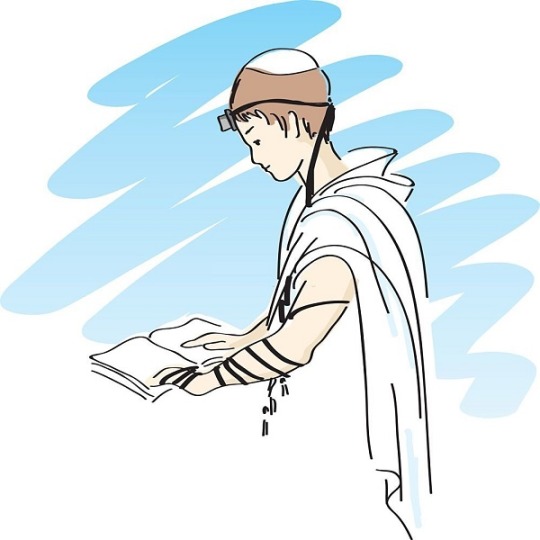
🕍🌟 Hey there, Tumblr family! Buckle up because today we are embarking on an extraordinary journey into the heart of Jewish tradition - the Bar Mitzvah. 📜✨ This cherished ceremony marks not just the coming-of-age of a young boy, but the blossoming of a whole community as it rallies to support and uplift one of their own.
But oh, it's so much more than just a celebration! It's a deeply symbolic journey of faith, tradition, and community, a vibrant tapestry of Jewish life coming alive in all its glory. We explore the profound significance of this rite of passage, the joyous preparations, the rituals, and the undeniable sense of Jewish peoplehood that makes a Bar Mitzvah so uniquely special. 🎉🔯
Whether you're reminiscing about your own Bar Mitzvah, gearing up for your child's, or simply curious about this captivating Jewish tradition, this blog is for you. It's an invitation to immerse yourself in the rich cultural heritage of the Jewish community, and feel the power of these traditions in shaping our collective identity. 💖
Curious? Inspired? Can't wait to know more? Take a leap into the journey of a lifetime with us: https://bit.ly/BarMitzvahCeremony Join us as we unravel the mysteries, share the joy, and celebrate the heritage. Because every Bar Mitzvah is a testament to our vibrant Jewish life - one boy at a time! 🌈
4 notes
·
View notes
Text
“Thirteen” Tips on Writing Jewish Characters / Some Jewish Identity Stuff Explained
So you want to write a Jewish character, but don’t want to write a caricature? Or are worried they won’t register as Jewish to readers, or something will be off or wrong? Well I, friendly (virtual) neighborhood Jewish professional, am here to help!
Note: The Jewish community is made up of roughly 14 million people worldwide with all sorts of backgrounds, practices, life circumstances, and beliefs. I’m just one American Jew, but I’ve had exposure to Jewishness in many forms after living in 3.5 states (at several different population densities/layouts), attending Jewish day school and youth groups, doing Jewish college stuff, and landing a job at a Jewish non-profit. I’m speaking specifically in an American or Americanish context, though some of this will apply elsewhere as well.
Let’s start with the word “Jew.” It’s not inherently a slur, but can absolutely be used as one. I am a Jew. You can call me a Jew, just not a Jew. Like most minority groups, there are slurs against us, but Jew is the proper demonym. It can be used disrespectfully as a noun, but isn’t inherently disrespectful. Think “Chava is a Jew” versus “You’re being such a Jew.” 1a. Any use of Jew as a verb by gentiles (non-Jews) is not okay. Your Jewish characters should be horrified by someone telling them they “Jewed down the price.” 1b. Any use of Jewess by gentiles is not okay and your Jewish character should not be cool with it. 1c. Many Jews would actively prefer to be called such because that’s what we are and “Jewish person” is stepping away from our Jewishness. But I get that not everybody is going to be comfortable calling us Jews. That’s okay, and “Jewish person/people” or “X is Jewish” is TOTALLY ACCEPTABLE. 1d. With that said, Jewish people refers to ourselves as Jews. If Sarah is Jewish but is squicked about referring to herself as a Jew, your Jewish readers will immediately know she’s written by a gentile. 1e. Actual slurs against Jews is a post for another time (did you know K*ke literally means circle?).
Your Jewish-American character likely does not speak Hebrew, Yiddish, Ladino, or any other Judeo-Language (languages that are a mix of Hebrew and at least one other language, typically written in the Hebrew abjad). Three notes on this, however: 2a. If your character is an immigrant or the child of an immigrant, they might speak the Judeo-language of the old country. The most common will be Israeli-Americans speaking Hebrew, but families still speaking Yiddish, Ladino, Judeo-Arabic, and other families do still exist. The children of Jewish immigrants might also speak another language that isn’t a Jewish one, like Russian or Spanish. 2b. If they are in a VERY religious Ashkenazi community, they might speak Yiddish at home and in the community. 2c. Odds are decent, however, that your American Jew can read but not understand Hebrew. If your character went to Jewish Day School or Yeshiva, they definitely read Hebrew, and will have some understanding of it (but likely not fluency).
Despite what I just said above, your Jewish-American character likely drops a lot of Yiddish words and phrases into their day-to-day speech. Which words/phrases in probably a list for another time, but the most common will be foods, family names (i.e. “Zayde” instead of Grandpa), and sassy expressions. They may incorporate some Hebrew to a lesser extent.
There’s not just one version of kosher. There’s kosher, kosher-style, Halav Yisrael, glatt kosher, etc. Depending on your character’s level of kosher, they’ve need a hecksher (kosher mark) on any given item or only eat at kosher restaurants, although not all Jews keep kosher and many keep “kosher-style” (i.e. only eat theoretically kosher things).
Your Jewish character should be a whole character, both in general and in relation to their Jewishness. This means, among other things, that they aren’t obsessed with Israel and I/P discourse one way or the other and that while writing you remember that not all Israelis are Jews and not all Jews are Israelis. Your Jewish character is not constantly agonizing over the I/P situation, has a life outside of their Jewishness, and shouldn’t be a cardboard stand-in for your desire to discuss the middle east.
The Jewish experience varies dramatically with geography. Jews living in Omaha, Richmond, Philly, Kansas City, Boca Raton, and New York City are all American Jews. They will have drastically different Jewish experiences. I strongly recommend doing research on the Jews in the specific place your story takes places, but generally: 6a. The closer you are to the northeast coast and NYC (except south Florida) the better and more varied your Jewish resources. 6b. NYC has the highest Jewish population of any city on the planet. Big cities like Boston, Chicago, and L.A., as well as just outside of NYC in NJ and NYS, and suburban/exburb south Florida will have lots of Jewish resources: day schools (Jewish + secular education mix), maybe Yeshivas (Jewish focus), multiple synagogues, a Jewish Community Center, Jewish dating services, social stuff, Jewish charities, and youth activities. Your character will have other Jewish friends and their gentile friends will likely know other Jews. Antisemitism is still a problem and usually takes the form of excluding Jews from activism, thinly-veiled stereotyping or excusing antisemitism from people from other oppressed groups, but it’s usually not as overt as elsewhere. Almost always safe to disclose Jewishness. 6c. Small and mid-size cities Denver, Virginia Beach, Charleston, and Harrisburg will have a JCC or Jewish federation, multiple synagogues, and maybe a Jewish day school. Your character is not the only Jew their gentile peers have met, but the bagels are meh. They will have other Jews to bond and commiserate with. Antisemitism here is mostly like that in big cities with occasional burst of overt incidents and attacks. It is generally physically safe for them to disclose Jewishness. 6d. Big towns and small cities in the south or mid-west will have maybe one synagogue - probably reform or Chabad. Your character will have to seek out Jewish spaces, but they will be easy to find. They will not be everybody’s First Jew, but it will be unusual. Antisemitism here is mostly overt - most of the antisemites your character deals with will be very obvious and many will be violent. Jews in such situations will not hide their Jewishness per se, but will be more selective in choosing to disclose it. 6e. Rural areas and small-small towns will not have a synagogue. Your character and their family may be the only Jews or there might be a small group that meets on occasion or carpools to the nearest synagogue. They will have to actively seek out the others Jews and they will be difficult to find. Disclosing their Jewishness is a serious consideration and not always safe. Odds are they are many people’s First Jew, which gets really weird real fast. Beyond the harmless ignorant-but-trying-to-learn-from-their-first-Jew types your character will interact with, there’s also violent and overt antisemitism here. 6f. If your character is in college, they will likely have a Chabad and/or a Hillel on campus if they are at a large school or a school with a significant Jewish population.
Related: when Jews meet each other for the first time, a game of “Jewish geography” ensues as they try and trace people they know in the other person’s state/city/community.
Jews come in all shapes, colors, sizes, genders, sexualities, politics, and religious beliefs. There are all sorts of Jewish people with tons of different intersecting identities. Don’t box yourself in to writing one kind of Jew. Just research a ton on the particular subsection of the Jewish community your character is a part of - a Mizrachi-Jewish Persian-American bisexual woman is going to have a different experience than a straight Ethiopian-American Jewish man who is going to have different experience from a queer Ashkenazi-Jewish-American girl with non-Jewish family. 8a. Jews with Ashkenazi (eastern/northern European) ancestry and customs are the biggest group in the U.S., but by no means the only group or representative of every Jew. Sephardi (Spanish/southern European/north Africa), and Mizrachi (north Africa and the middle east) are the next biggest groups. It would not be unusual for your character to have Polish-Jewish, Iraqi-Jewish, Moroccan-Jewish, or Russian Jewish ancestry or a mix. 8b. Each of these groups have their own customs, Judeo-languages, local holidays, and local historic tragedies. Generally, historic Sephardi communities were linked between themselves, historic Ashkenazi communities were linked between themselves, and historic Mizarchi communities were linked between themselves. The three had some, but limited contact. Additionally, all three major groups have subdivisions within them. 8c. There are also smaller groups that don’t fall within the three traditional categories, like the Ethiopian Jews, the Cochin Jews (India), Chinese Jews, Gruzim (Georgian), and more. Most of these smaller groups were not in contact with the wider Jewish world. 8d. All Jewish groups start from the same base texts (the written Torah), and the majority include the oral Torah as well. Local interpretations and traditions develop, these are referred to as minhag(im) (customs). For example, the biblical commandment is to not boil a baby goat in its mother’s milk. Some communities extend this to mean no chicken and milk, others reason that chickens don’t produce milk so the mixture is acceptable. Both are equally valid interpretations rooted in tradition, but they are different. 8e. Marrying between Jewish subgroups in the U.S. is super common and outside of extreme or really intense groups is not frowned upon. Traditionally, the father’s minhagim are followed, i.e. a Syrian-Jewish father and a Spanish-Jewish mother would follow the Syrian-Jewish minhagim with their children. Many modern couples choose the mother’s traditions or mix them up, but that’s the traditional route.
Unless they are VERY religious, your character’s family is unlikely to be particularly wound up about them being LGBTQ the way a comparably Christian family might, at least not because they’re Jewish. Samuel’s Jewish mother is likely unconcerned he likes boys and is much more empathetic than he must marry a Jewish boy and raise any kids Jewish.
There are so many Jewish holidays, and they are not all celebrated the same or with the same intensity. Probably enough material for its own post, but the ones most likely celebrated by your character: 10a. Shabbat and/or Havdalah. Shabbat starts Friday nights with candles, wine/grape juice and challah bread, Havdalah ends Shabbat with a braided candle, wine, and aromatic spices. Shabbat dinner is usually a meat meal and it is common to invite guests or eat with friends and family (in normal times). 10b. The “High Holidays” - Rosh HaShanah and Yom Kippur. Jewish students often skip school for these. Yom Kippur is a 25 hour fast with services all day, Rosh HaShanah has services in the evening and morning. 10c. Passover - arguably the most important holiday. Celebrated with two sometimes agonizingly long Seders (ritual meals), family gatherings, and abstaining from leavened bread for 7/8 days. 10d. Hanukkah - Not actually that spiritually important, but culturally important for American Jews. Typically celebrated with candle lighting, presents, visits to family members, and greasy food.
There’s a lot of wine involved in Jewish ritual, so it’s unlikely your character’s Jewish family are teetotalers.
Jewish families tend to be very intense, loud, opinioned, caring, and involved, compared to many other assimilated American families. Shabbat dinner is not quiet. Dissent is a Jewish value - differing opinions are allowed (and expected in many circles), as is the ability to argue/defend competently.
Jewishness can mean ethnic identity, cultural identity, and/or religion. There are several major denominations religiously, although that needs to be its own post in detail. The noteworthy movements at this point are Orthodox (further subdivided into Ultraorthodox and Modern Orthodox), Conservative (middle of the road, no relation to conservative politics), Reform, and Reconstructionist (both very “choose your own/your community’s adventure).
Probably will write more parts in the future, but this is heinously long already! Hope this is helpful!
#jewish#jewish writing#jewishwriting#jewblr#writeblr#writing advice#jewish identity#jews#jewishidentity#super long post sorry not sorry#writing jewish characters#writing jews#jewish writing help#jumblr
270 notes
·
View notes
Photo

Dear family, Our story has been longlisted for The Women's Prize for Playwriting! News of the shortlist is due next week. In the meantime, any and all good vibes are appreciated, but above all I'm so honoured to have made the list! #HopeAndHerChildren #WomensPrizeForPlaywriting @painesplough #Playwright #Theatre #newwriting #jewishdiaspora #jewishidentity #multiculturalism #playwrightsofinstagram #fringetheatre #jewishtheatre https://www.instagram.com/p/CWTT9zAoZsY/?utm_medium=tumblr
#hopeandherchildren#womensprizeforplaywriting#playwright#theatre#newwriting#jewishdiaspora#jewishidentity#multiculturalism#playwrightsofinstagram#fringetheatre#jewishtheatre
4 notes
·
View notes
Text
Uncovering Hidden Histories | The Role of Israeli Filmmakers | Israeli Trailblazers Show
youtube
In this video, director Duki Dror discusses his path of storytelling, identity, and how Israeli cinema has influenced the world. From his background as a refugee to studying the moral conflicts within Israeli society, Dror enlightens us on the strength of film in recording unseen histories and influencing the way the world thinks.
#israelicinema#dukidror#supernovafilm#filmmaking#jewishidentity#storytelling#israel#documentary#middleeast#jewishhistory#filmindustry#cinema#survivorstories#truthmatters#holocaustlegacy#Youtube
0 notes
Text
RM Bellerose, a trailblazer and indigenous rights activist, unleashes a thought provoking tsunami of rational analysis layered on a bedrock of common sense and truths.
""I used to believe that there should be 2 states, that if Israel compromised a bit the Arabs would accept a 2 state solution and that it would be the most fair and equitable solution.
I believed that there was some equivalency between the arabs and the Jews, after all they had created a nation state and the arabs were already living there. I believed that the Arabs just wanted the same things we all want, peace, equality, prosperity and the ability to live a good life. And that they would do what they needed to make that happen.
Then I went to Israel.
Now I understand that there are already 2 states, Israel and Jordan. That the land the Arabs claim as "their ancestral lands" are in fact no such thing and that in many cases they literally ethnically cleansed them of Jews. that most if not all of these Arab areas, have Jewish sacred places and ancestral places in them. as an indigenous rights activist, the fact that the Arabs have stated they will not allow Jews access if the Arabs are in control, means I cannot abide them ever being in control.
I have seen that there is no equivalency, the Arabs have refused time and again, to even negotiate without concessions being made before they even come to the table. The violence appears one sided because the Arabs are so inept and incompetent that they try and try yet fail to actually kill Jews in any numbers, yet the Israelis continue to use pinpoint tactics while fighting random attackers. The Arabs hide behind women and children while targeting women and children and till the Israelis refuse to take the bait. there is no moral equivalency. The Israelis build bomb shelters for kids, the Arabs put kids in buildings to shelter their bombs.
The history shows clearly that by the time of the ottomans, the vast majority of Arabs who actually were living in what is now Israel, didn't own the land, they were tenant farmers much like European peasants. it was a landowner class that lived mainly in Beirut and Damascus who owned everything. The Arabs were not native to the land they were in fact descended from colonists themselves. some carried Jewish blood from the waves of forced conversions. But they were not indigenous in any tangible way.
Then I spoke with Arabs, and unlike the leftists, I actually listened. and unlike the leftists, I understood the difference between individuals and groups, as a group the Arabs have made it clear that anything less than everything is unacceptable, they do not care if they get Judea and Samaria they want Jerusalem and Caesaria and everything in between. from the river to the sea is their mantra. as a group they are genocidal, hateful and completely unredeemable. They have refused every offer for peace, they fill their children with hate and they have become inveterate liars.
Now as for individuals? I spoke with a few who wanted an end to the conflict and didn’t care if it meant becoming Israeli citizens as long as they had peace. I spoke to one little wee guy in Jerusalem (Ari Fuld is a witness) who said he had Jewish friends and wanted to be able to live without problems. I had dinner with a family where the father was in tears speaking of his childhood where he went to school with Jewish kids, had Jewish friends and worked for a Jewish company but after Oslo couldn’t do anything of those things. his sons called him a "traitor" and said he was soft. I have empathy and sympathy for individuals, I do not have anything but enmity for the group.
The left has decided that its progressive values are more important than anything else, and they have decided that inclusiveness and empathy are more important than security. This is why in Israel, where people tend to be very pragmatic about security, the left is eroding and the right is ascendant. And as it becomes more obvious, the left becomes ever more strident and shrill. The recent nation-state law is a case in point. Israel is the Jewish nation state, built on Jewish ancestral lands, by Jews. The language is Hebrew and the character of the state is Jewish, as evidenced not only by the freedom of minorities there but by the argumentative nature of the state itself. Yet the reaction to Jews asserting themselves has ever been inclined towards hysterics, even from Jews themselves. Empowered by the left who think they see an opportunity to be divisive and not be blamed for it, some minorities are trying to claim it infringes upon their rights, yet the truth is that without the Jewish nature of the country, they would have none
#palestinian#israeli#israel#palestine#PLO#hamas#hezbollah#jordan#hebrew#judaism#jewish#bellerose#ryanbellerose#commonsense#truth#politics#middle east#jewishidentity#Judea#samaria#gaza#secular-jew
30 notes
·
View notes
Photo

Rosh Hashana is just around the corner! No matter how you transliterate and spell #RoshHashana #RoshHashanah #RoshHashanna #RoshHashannah #RushAHomeAh , the Jewish New Year is a time to join together (even if virtually). Join me and @JewBelong as we celebrate the Jewish High Holidays with this virtual experience. For more information and free tickets go to @JewBelong or JewBelong.org. . . . . . . . #YuvalDavid #JewBelong #SinsStarsShofars #VirtualHighHolidays #highholiday #highholidays #americanjew #virtualevent #synagogue #jewishidentity #jewishactor #jewishfilmmaker #jewishdirector #jewishadvocate #jewishactivist #holiday #holidays #Israel #israeli #virtualexperience #jewish #judaism #jews https://www.instagram.com/p/CFJ-R41hdW6/?igshid=3z3ix68gpadd
#roshhashana#roshhashanah#roshhashanna#roshhashannah#rushahomeah#yuvaldavid#jewbelong#sinsstarsshofars#virtualhighholidays#highholiday#highholidays#americanjew#virtualevent#synagogue#jewishidentity#jewishactor#jewishfilmmaker#jewishdirector#jewishadvocate#jewishactivist#holiday#holidays#israel#israeli#virtualexperience#jewish#judaism#jews
0 notes